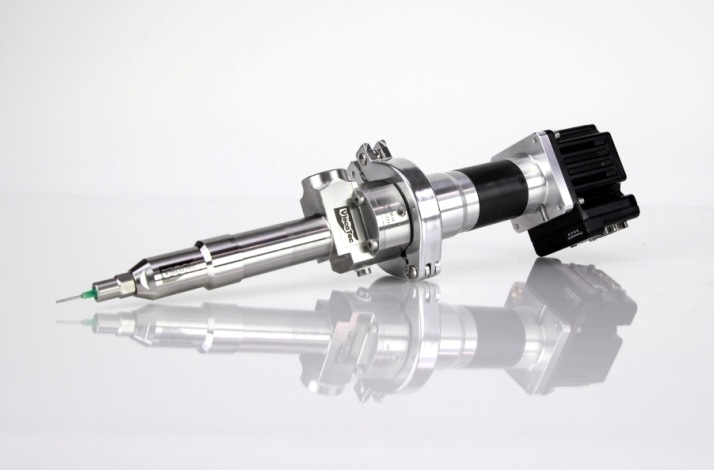Jan 25 2019
Fillers in adhesives, potting compounds and encapsulants can lead to mechanical abrasion in dispensing systems. Despite such potentially abrasive behavior, the adhesives can be dispensed reliably and precisely over the long term. This is the result of experimental tests performed by ViscoTec and DELO Industrial Adhesives, covering more than 6 million dispensing cycles.
 Even with abrasive media, the ViscoTec 3RD8 dispenser ensures trouble-free dispensing (Figure: ViscoTec)
Even with abrasive media, the ViscoTec 3RD8 dispenser ensures trouble-free dispensing (Figure: ViscoTec)
Many sectors, such as the automotive or electronics industries, have to meet constantly increasing requirements in terms of temperature stability and media resistance. For this reason – but also to achieve properties such as electrical or thermal conductivity or adapted expansion coefficients – adhesive manufacturers fill their products with additional raw materials. These robust and mostly mineral or metal fillers are increasingly used in adhesives, but are considered abrasive and thus difficult to dispense. This assumption has now been proved wrong by long-term tests.
The eco-PEN and RD dispensing units from ViscoTec with two elastomer stators each were examined in this test series. Six epoxy resins from DELO with different fillers were used. The filler content in all cases was between 25 and 50 percent, which is typical for adhesives.
Initially, the stators were placed in adhesive for 168 hours to investigate their general chemical suitability for long-term contact. Subsequently, the change in mass, the dimensional accuracy as well as the hardness and elasticity of the elastomers were examined. This revealed no abnormalities or deviations from the tight production tolerances. Chemical interactions between the two components, which would affect subsequent results, could thus be excluded.
This test phase was succeeded by 24 long-term tests consisting in cyclic dispensing operations: two seconds of dispensing were followed by a one-second pause to simulate a typical dispensing behavior of automated manufacturing processes. Each test series comprised just under 300,000 dispensing cycles, corresponding to about 30 kg of dispensed adhesive for the eco-PEN dispensers and about 240 kg for the RD dispensers. After every 20 hours, three dispensing shots were weighed and compared over time. A change in their mass would indicate wear on the dispenser due to an abrasive effect of the adhesives. In fact, the test results confirmed accurate and repeatable dispensing for all test pairs.
“The tests show that even hard fillers in combination with high filler contents do not impede permanently reliable and reproducible dispensing of our high-performance adhesives”, says Karl Bitzer, Head of Product Management at DELO.
Before and after the endurance tests, the rotors made of hard chrome-plated stainless steel and the elastomer stators of the dispensing units were also measured. Result: After every 300,000 dispensing cycles, no signs of wear were visible on the rotors and only minimal signs of wear on the stators. The changes to the stators were so small that the dimensions were still within the tight manufacturing tolerances.
“Permanently reproducible and accurate dispensing was possible for all dispensers and stators. This is made clear by the fact that, despite the abrasive test media and the large number of dispensing cycles, our dispensing units did not reach the end of their lifetimes within the test period”, added Manuel Paintmayer, Relationship Management Material Manufacturing at ViscoTec. “That is a really great result.”